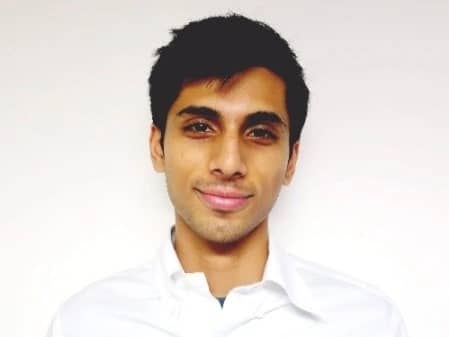Srikar Varadaraj
Srikar Varadaraj 是 Spectral 的联合创始人,该公司专注于构建新的身份工具和信用评分基础设施。他也是 Eternis 的创始人,该公司专注于为个人提供信任基础设施,以拥有私有的统一身份并将密钥委托给人工智能。
概述
Srikar Varadaraj 参与了 区块链 和人工智能领域,专注于开发身份、信用评分和信任基础设施的工具。他拥有计算机科学和数学背景,拥有哥伦比亚大学的学位,并在纽约大学库朗数学科学研究所攻读博士学位。Varadaraj 拥有作为顾问和合伙人在各种风险投资中的经验,包括 Scroll 和 EIV,并投资了包括机器人、生物技术和数据收集在内的各个领域的公司。
Varadaraj 的工作以人类的未来和人工智能的影响为中心,其兴趣涵盖人工智能科学、密码学基础设施和科学研究的创新融资方法。他目前是 Eternis 的首席执行官兼联合创始人,该公司致力于解决资源分配、AI 代理的委托密钥以及可信执行环境中的 AI 模型等方面的挑战。
教育
- 纽约市哥伦比亚大学:
- 计算机科学硕士学位 (2017-2018)
- 数学和计算机科学学士学位 (2013-2017)
- 纽约大学库朗数学科学研究所:
职业生涯
Srikar Varadaraj 的职业生涯包括在 区块链、密码学和人工智能领域担任职务。他拥有去中心化技术、零知识证明系统以及链上信用风险评估工具的开发经验。
Varadaraj 的早期职业生涯包括 2012 年至 2013 年在 Agastya 国际基金会担任国际象棋教练。然后,他于 2014 年至 2017 年在哥伦比亚大学担任助教。2016 年,他曾在 Google 担任软件工程师实习生。从 2017 年 5 月到 2019 年 5 月,Varadaraj 创立了一家专注于应用密码学和 区块链 的初创公司,同时还为风险投资基金提供咨询,并开发了一种用于在 EOS 上自动 质押 的产品。
从 2019 年到 2021 年,他是纽约大学库朗数学科学研究所的博士候选人。2021 年,Varadaraj 成为 e^{i} Ventures 的合伙人,这是一家风险投资工作室,他在那里探索了从 B2B SaaS 到预测市场的各种想法。他还是 Scroll 的早期顾问,Scroll 是一种 zk-rollup 扩展 Ethereum 的解决方案。目前,Varadaraj 是 Eternis 的联合创始人兼首席执行官,也是 Bluebirds 的合伙人。[1] [2] [3] [4] [5] [6] [7] [8] [9] [10] [11]
访谈
华盛顿人工智能网络 #01 访谈
在华盛顿人工智能网络于 2024 年 11 月 15 日发布的播客节目中,Srikar Varadaraj 讨论了他对人工智能、隐私和数字身份交叉点的看法。在与主持人 Tammy Haddad 的对话中,他概述了开发能够代表个人自主行动的可信 AI 代理 所涉及的基本挑战和机遇。
Varadaraj 认为,未来的 AI 代理 可能会承担越来越复杂、长期的任务,堪比电影《Her》中描绘的虚构 AI。为了支持此类发展,他强调迫切需要新的互联网协议,重点是验证身份、确保数据来源和保护用户隐私。他将这些协议与现有的安全标准(如 TLS)进行了比较,并提出了用于 AI 代理验证的类似系统。
对话探讨了以人为本的数字身份的概念,将其作为将权力委托给 AI 代理的先决条件,并强调在没有可验证性机制的情况下构建的系统可能会加剧诸如错误信息和缺乏问责制等问题。他指出,越来越难以区分真实内容与 AI 生成的深度伪造内容,并建议用户和应用程序需要技术解决方案来独立评估内容的真实性。
Varadaraj 还评论了可信执行环境、生物识别身份系统和密码学证明在实现安全和保护隐私的委托方面的作用。他将这些与全球数字身份计划进行了比较,认为普遍可互操作的身份标准可以显着改善 AI 驱动经济中的资源分配和社会信任。
在更广泛的采用方面,他强调了 AI 研究实验室、政府和标准化机构之间需要合作。虽然他承认不同机构优先事项带来的挑战,但他认为,随着 AGI 开发的加速,早期协调对于防止公众信任和基础设施方面的差距至关重要。
在时间表方面,Varadaraj 预计通用人工智能可能会在 5 到 10 年内出现,这受到该领域竞争势头的推动。最后,他倡导关注道德架构、机构保护和开放合作,并向从事密码学、AI 安全和安全系统研究的研究人员发出了公开邀请,以促进 Eternis 的工作。[12]
